
- Afhalen na 1 uur in een winkel met voorraad
- Gratis thuislevering in België vanaf € 30
- Ruim aanbod met 7 miljoen producten
- Afhalen na 1 uur in een winkel met voorraad
- Gratis thuislevering in België vanaf € 30
- Ruim aanbod met 7 miljoen producten
The Thematic Structure of the Sentence in English and Polish
Sentence Stress and Word Order
Aleksander Szwedek
€ 56,95
+ 113 punten
Omschrijving
The initial aim of the book was to describe Polish equivalents of the English articles. The functions of the articles were found in Polish to be expressed by word order and sentence stress (in neutral intonation). Word order and sentence stress were also analysed in English in view of the different nature of word order. Native speakers were asked to read given texts, which were recorded, and to comment on the intonation. The author concludes that the functions of the articles are part of Functional Sentence Perspective (FSP) and that the general tendency is to put new information in final position. In Polish, this is achieved by word order and sentence stress, in English by stress and some syntactic means. Furthermore it is found that in both English and Polish, the noun determines the position of the sentence stress - it always falls on the new noun if such is present; in the absence of such a noun the stress is put on the next available word as far to the end of the sentence as possible.
Specificaties
Betrokkenen
- Auteur(s):
- Uitgeverij:
Inhoud
- Aantal bladzijden:
- 144
- Taal:
- Engels
- Reeks:
- Reeksnummer:
- nr. 4
Eigenschappen
- Productcode (EAN):
- 9783631635322
- Verschijningsdatum:
- 25/11/2011
- Uitvoering:
- Hardcover
- Formaat:
- Genaaid
- Afmetingen:
- 148 mm x 210 mm
- Gewicht:
- 289 g

Alleen bij Standaard Boekhandel
+ 113 punten op je klantenkaart van Standaard Boekhandel
Beoordelingen
We publiceren alleen reviews die voldoen aan de voorwaarden voor reviews. Bekijk onze voorwaarden voor reviews.










